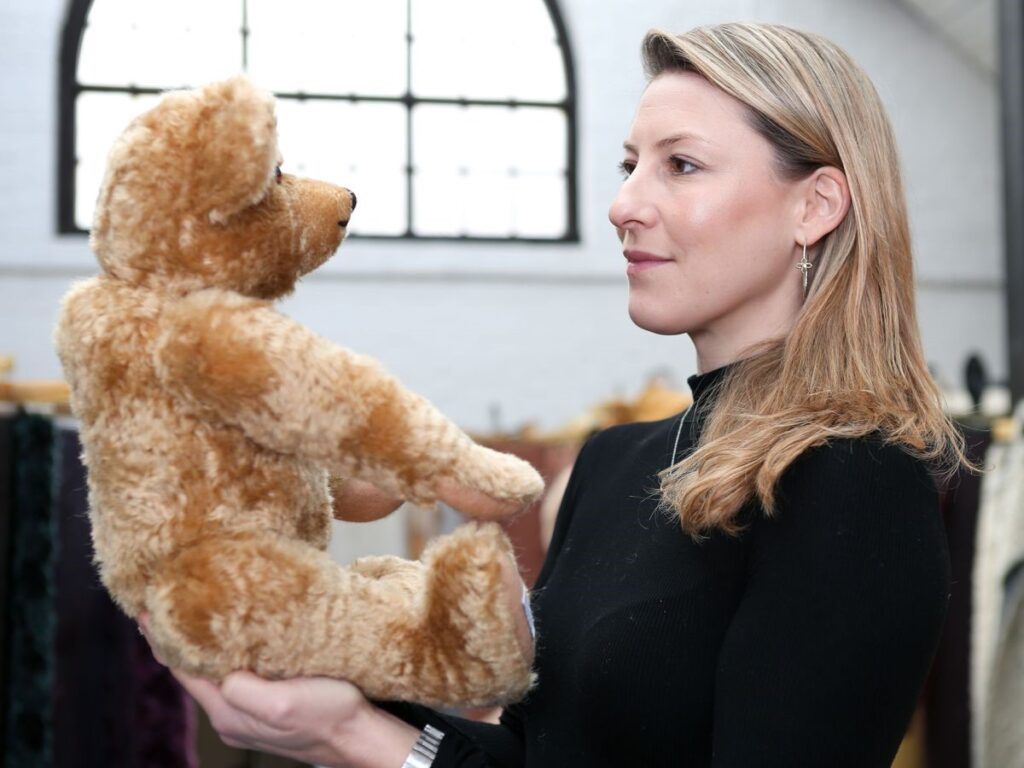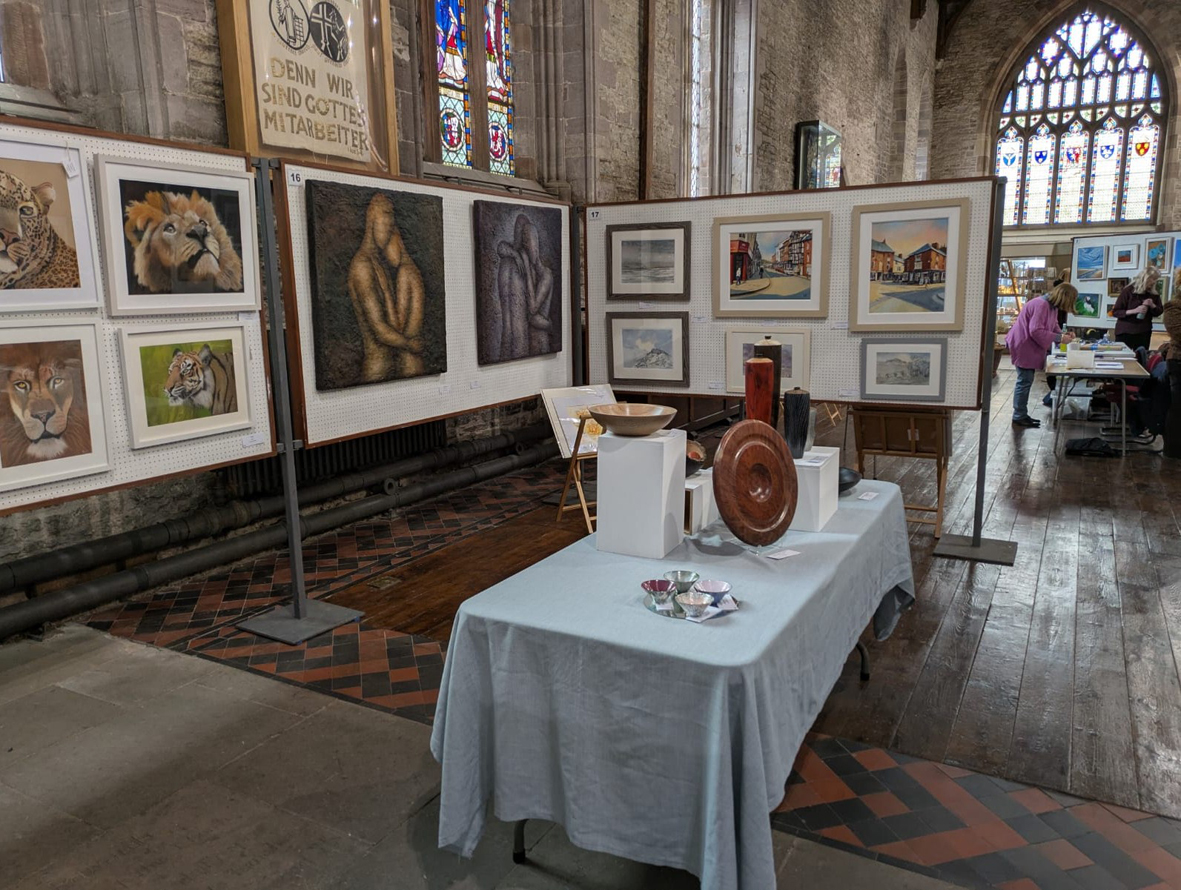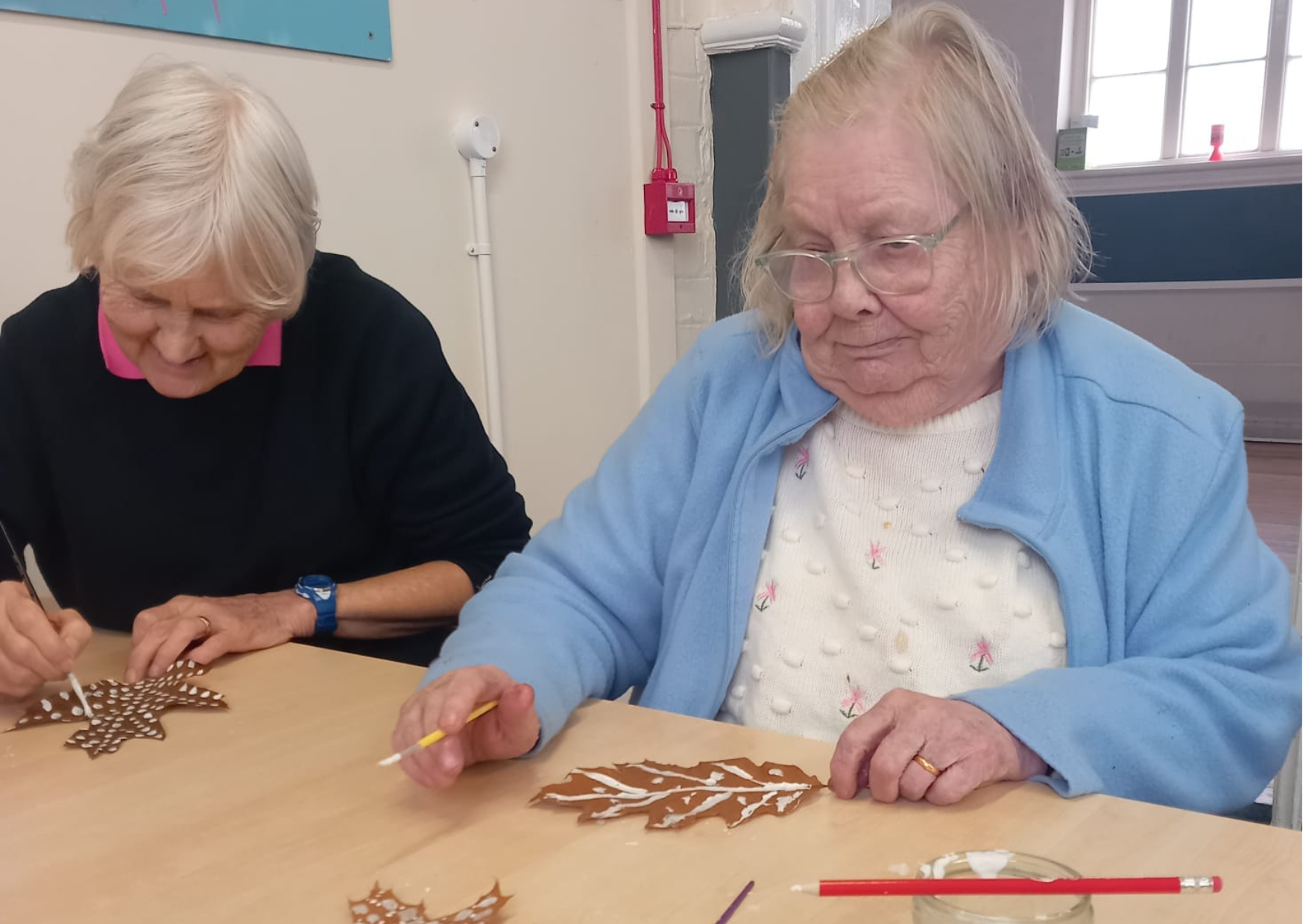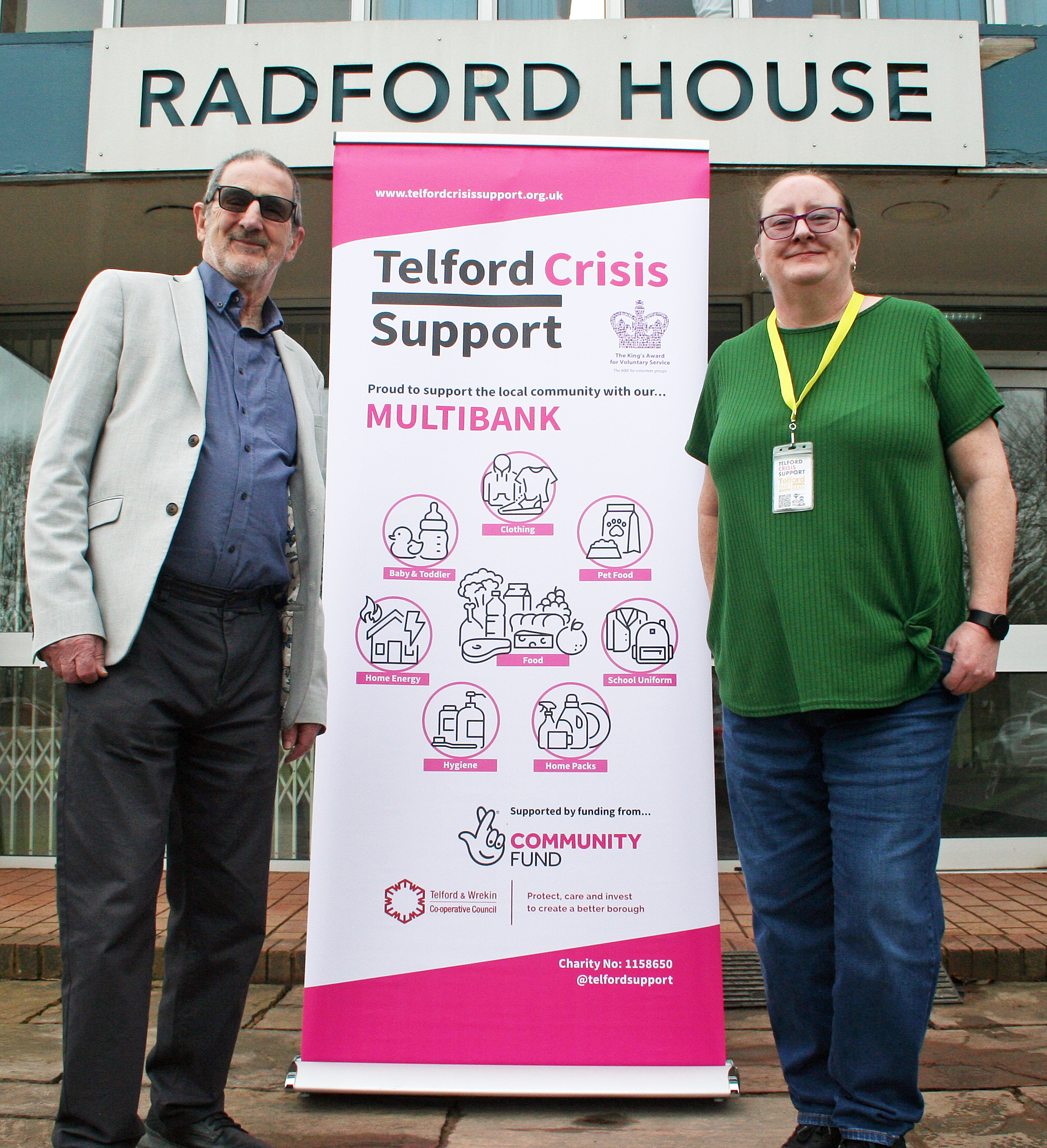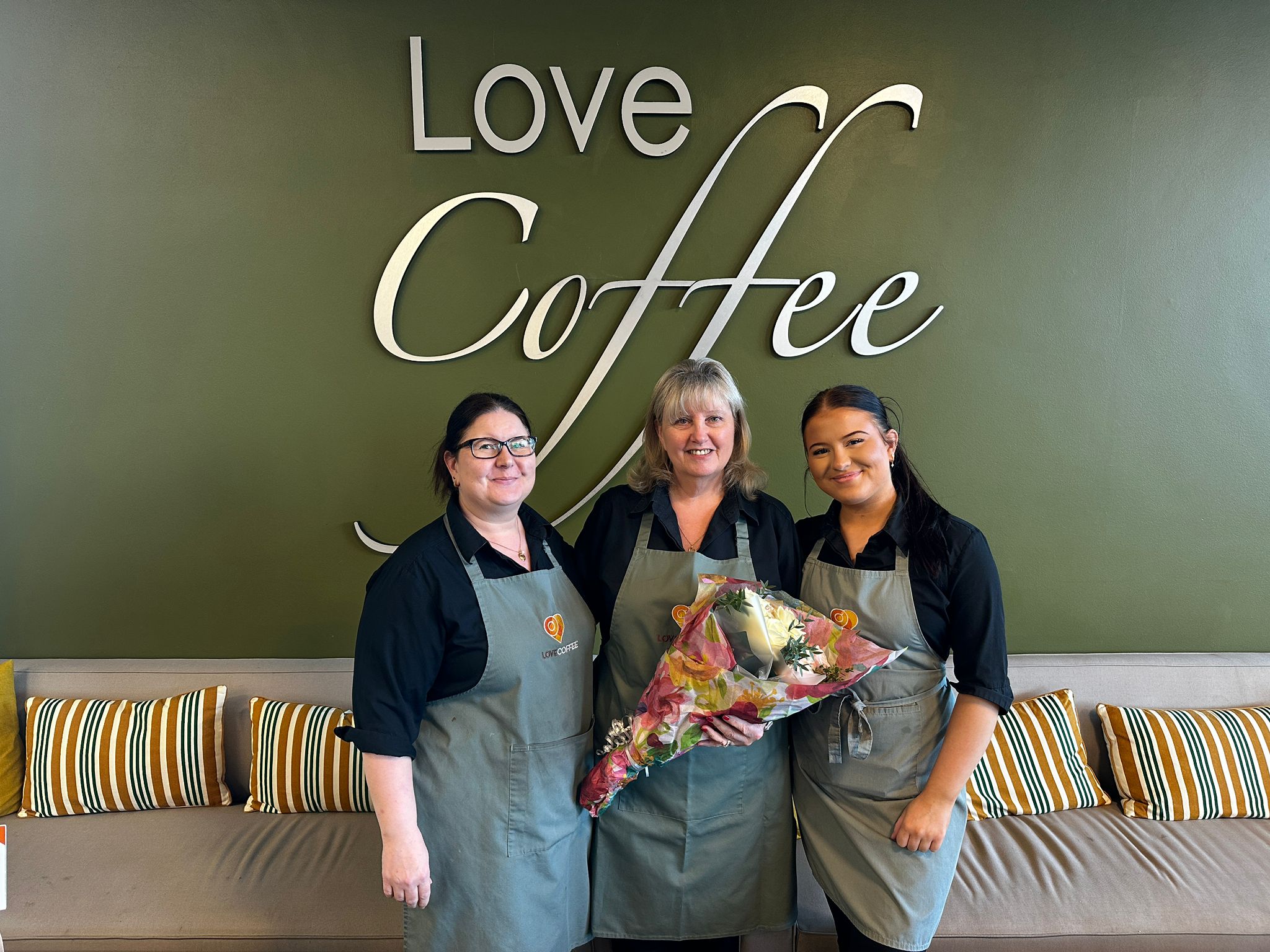It has been the must-have toy for generations. And no one makes a teddy bear quite like Ironbridge-based Merrythought. Neil Thomas met MD Sarah Holmes to hear more.
Christmas is fast approaching and thoughts invariably turn to gifts for under the festive tree. What to buy?
It is a challenge, particularly choosing for children, not least because toys and games have changed almost beyond recognition in the past 50 years. What kept children enthralled in the 1970s is a far cry from the digital world they are entertained by today.
Yet there is undoubtedly one constant – a gift which seems to hold back time. It is a toy that has never gone out of fashion since its first appearance nearly 125 years ago. The Teddy Bear.
It (though invariably referred to as he or she) is still seen as the perfect Christmas present for people of all ages – as well as the quintessential comfort gift for a newborn. It is the premier soft toy that people can’t bear (forgive the pun) to part with. A beautifully crafted bear made from the finest materials has the quality and durability to last for decades. Well-cared for, it is the gift that keeps on giving. A gift for life.
Someone who knows a thing or two about quality teddy bears is Shropshire’s Sarah Holmes. Sarah is the Managing Director of Merrythought, a unique company in British industry as the last remaining soft toy factory in the UK, producing hand-made, premium quality teddy bears. In a soft toy market saturated by cheap, inferior Far Eastern imports, Merrythought products stand as a beacon of British craftsmanship and excellence.
Sarah is the fourth generation of a family firm that celebrates its 95th anniversary this year. Merrythought still occupies the site in Ironbridge on which it was founded in 1930, a constant presence in an ever-changing world. It survives because people love its bears.
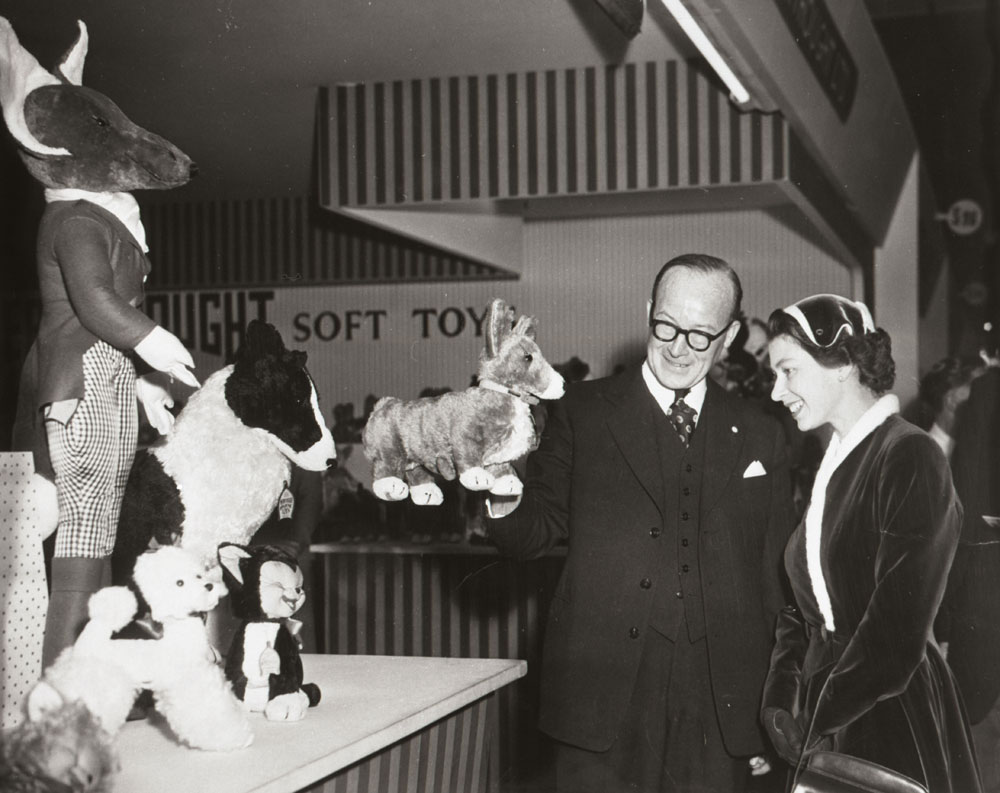
“The demand is out there,” Sarah says. “Some of it is from collectors who want to add the latest limited-edition bear and some from parents and grandparents looking to buy lasting gifts for young children. But, given the perception that they spend so much time on their phones and computers, we have seen a rise in demand from Gen Z who are also starting to collect our teddy bears.”
It is a reassuring trend in a difficult economic climate. “The financial burden on businesses has undoubtedly increased and this is particularly challenging for SMEs (small and medium-sized enterprises),” Sarah reflects. “It’s tough at the moment, but we’ve overcome significant challenges in the past. We survived the Second World War, when the Government took over the business and our team manufactured textiles for the war effort. As a company, we’ve shown ourselves to be very resilient.”
That resilience means that Merrythought is celebrating its 95th birthday this year while casting a confident eye towards reaching its century in five years.
A 95th anniversary free event was held in September at the Merrythought Exhibition in Ironbridge’s Museum of the Gorge. Visitors had the chance to chat to Sarah, meet The Teddy Bear Ladies Julie Tatchell and Amanda Middleditch from BBC television’s The Repair Shop, see Teddy Bear making demonstrations by the company’s skilled factory team and take part in competitions.
The exhibition itself was launched in April and runs until 4 January next year, taking visitors on a fascinating journey through the four generations of Merrythought and its role within the story of the Ironbridge Gorge UNESCO World Heritage Site. Suitable for all ages, there is a learning and activity area, a showcase of the company’s key designs and a photo booth with a giant Merrythought bear.
And, of course, there is a special 95th anniversary commemorative Teddy Bear. This limited-edition creation marries Golden (50th) and Sapphire (45th) anniversary years and has been beautifully hand-crafted from two tones of the finest golden mohair, combined with pure cotton velvet.
It is the latest in a series of distinguished specially-created bears celebrating special milestones, both for the company and country. In recent years, Merrythought has created teddy bears to celebrate the life of Her Majesty Queen Elizabeth II and the coronation of King Charles III, as well as other royal events. Indeed, Merrythought was commissioned to produce exclusive Royal Baby teddy bears for the Royal Collection Trust, operator of the official Buckingham Palace Shop, with number one of each limited edition being gifted to the respective Prince or Princess.
As a prestigious British brand, Merrythought was approached by the organisers of the London 2012 Olympics to produce the official teddy bears for the Olympic Games, Paralympic Games and Team GB. The collection proved very popular as high quality souvenirs of the event, with a special gold edition bear selling out within hours of the opening ceremony.
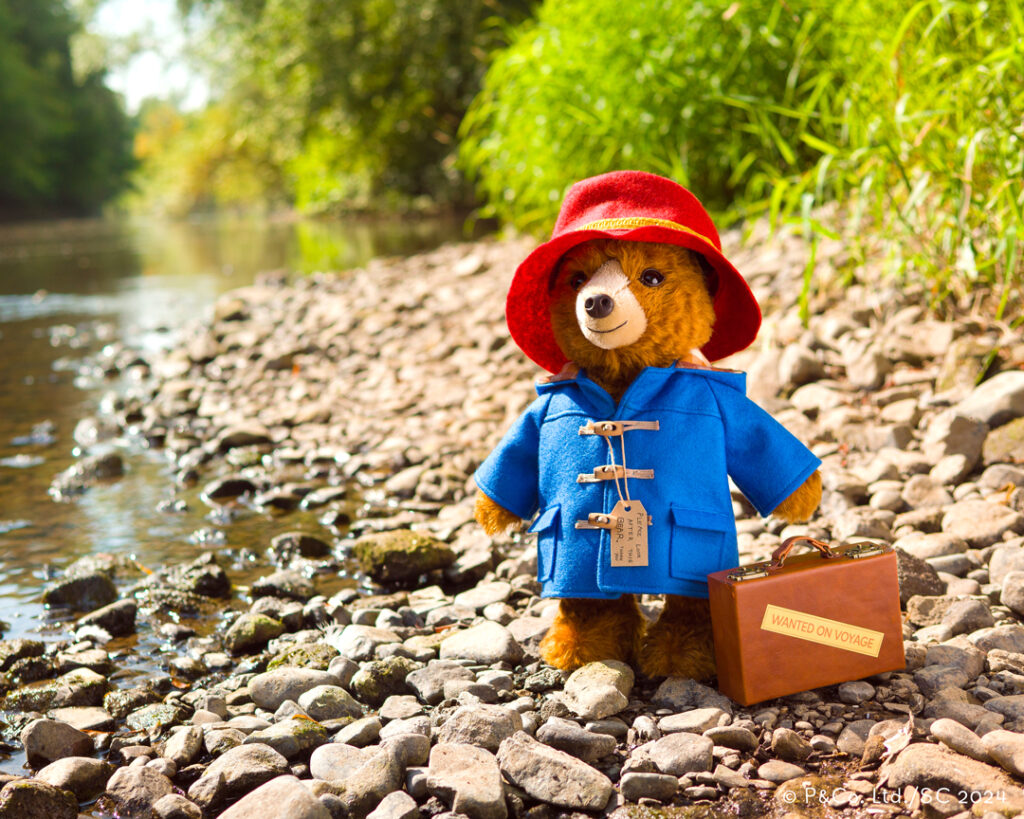
Merrythought plays a prime role in other areas of the nation’s cultural life too, celebrating British icons and institutions. The company has produced a recreation of one of the world’s most famous – and best-loved – bears, Paddington. Michael Bond’s 1958 creation is the star of nearly 30 books, television series and three major feature films, Paddington (2014), Paddington 2 (2017) and last year’s Paddington in Peru.
Merrythought’s Paddington™ is a meticulously detailed recreation of everyone’s favourite marmalade-loving bear, intricately designed and lovingly handcrafted to capture Paddington’s engaging personality.
The deal to bring Paddington into the Merrythought family is one of Sarah’s personal highlights.
“I always wanted to work with Paddington. Although he was born in Peru, of course, you can’t get a more quintessential British icon and we are very much a quintessential British firm. It’s the perfect partnership.”
It’s far from the first time that Merrythought has brought recreations of cherished family favourites into people’s homes. The company has designed and manufactured an array of famous Disney characters over more than 70 years, including Mickey Mouse, Donald Duck, Pluto, Lady and the Tramp, Bambi and Thumper. Other well-known characters to have appeared in Merrythought’s collections have included Harry Corbett’s Sooty and Hanna Barbera’s Yogi Bear.
One of children’s literature’s most famous bears, Winnie the Pooh, first appeared in the Merrythought range in 1966, complete with his little red top, and remained in the catalogue for a further decade. On the wall of Sarah’s office is a framed film poster for the 2017 feature film Goodbye Christopher Robin, about the life of Winnie the Pooh’s creator AA Milne and his family, particularly his son Christopher. The poster is signed by director Simon Curtis and stars Domhnall Gleeson, Margot Robbie and Kelly Macdonald.
Sarah picks up the story behind it. “Given our heritage in producing classic British teddy bears, the film company Fox approached us about recreating one rather famous bear, Edward, for the film.
“Originally made by JK Farnell, producer of the first British teddy bear and the country’s oldest soft toy brand, Edward was Christopher’s much-loved childhood teddy bear, and the inspiration for Winnie the Pooh,” Sarah continues.
“Since Merrythought had owned the Farnell brand for many years and was experienced in recreating their classical designs, we were able to produce a beautiful replica that starred throughout the 2017 film. The bear continues to be one of our most popular Traditional Collection products to this day.”
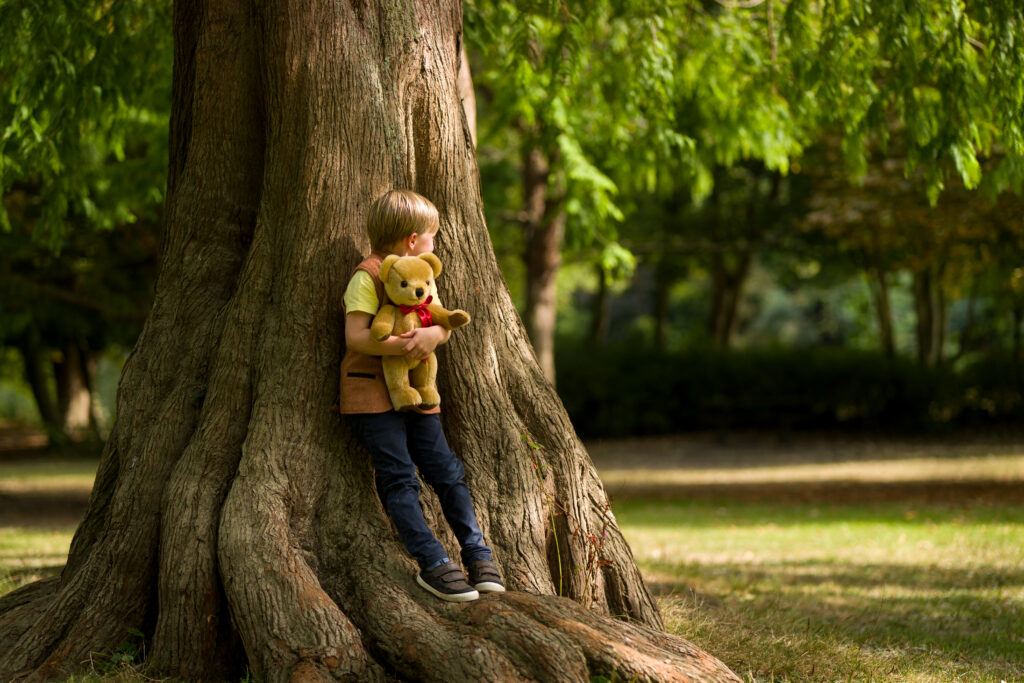
Merrythought products are high end – retail partners include London department stores Fortnum and Mason and Harrods, Mayfair-based luxury leather and gift store Aspinal of London and the legendary Tiffany & Co of New York. Although the price reflects this – a small Paddington™ costs £179, a large one £329 – there are things to bear (again, no pun intended) in mind.
Production costs are high. The design process – particularly for licensed products like Paddington – can take up to six months. The toys are hand-stitched using premium materials. The best quality natural plush is selected and neatly cut to each soft toy’s unique set of patterns, many of which are based on original templates from the earliest years. Incorporating other natural materials, such as wool felt and cotton, the pieces are expertly worked with traditional needle and thread to form each part of the bear. The eyes, legs, arms and joints are skilfully sewn and assembled by hand, gradually creating the recognisable characteristics of a Merrythought bear.
After care is taken to fill the soft toy to an optimum weight using certified recycled fibre, it is then ready for the finishing touches; a carefully hand-embroidered nose and smile, a thorough brush and trim, and a neatly tied bow or accessory.
“A Merrythought bear, if looked after, can last for life whereas cheap products, with poor-quality materials and stitching, won’t tend to last anywhere near as long. Buying cheap can be false economy in a way,” Sarah says.
“We have many skilled people in our inhouse team, many of whom have been with us for years. To train someone up to the level required is quite time and cost intensive. This has to be factored into the retail price. Happily, a lot of customers think it is worth it.
“In a world where so much is mass-produced by machines, to be used briefly then discarded, we’re proud to be different.”
The culture of prizing quality over quantity was established by Merrythought’s founding father Gordon Holmes.
Toy bears emerged on the market in 1902 in Germany, becoming popular soon after in the United States when they became associated with a newspaper story about President Theodore ‘Teddy’ Roosevelt. Initially marketed in New York as Teddy’s Bear, this soon morphed into Teddy Bear and the rest is soft toy history.
Gordon Holmes wrote his own chapter in this history in 1930. He was already a renowned entrepreneur in the British textile industry, a director of the Yorkshire-based yarn spinning business Holmes, Laxton and Co. Cherishing an ambition to move into teddy bear manufacture, he purchased mohair weavers Dyson, Hall and Co to secure the supply of high-quality teddy bear plush.
Relocating to Ironbridge, he recruited a top team to help him build his new company into a market leader, bringing in the production expertise of Clifton Rendle, formerly of West Midlands toy company Chad Valley, and Henry Janisch, who had headed sales for Britain’s oldest soft toy maker, J. K. Farnell. The new management team developed a skilled workforce and started driving sales. The firm took the name Merrythought – and Sarah admits with a smile she has no idea why her great grandfather chose the name, other than it stands for positivity and good wishes.
“It’s actually a 16th century word meaning the wishbone of a bird, which is said to bring good luck when broken between two people. But it’s a happy, upbeat word which is why, perhaps, it has worked so well.”
Merrythought’s inaugural collection was designed by Florence Attwood, a remarkable pattern maker who overcame deafness, and being non-verbal, to create some truly memorable designs. This included the original Merrythought and Magnet teddy bears, which still have a strong influence on the designs of today.
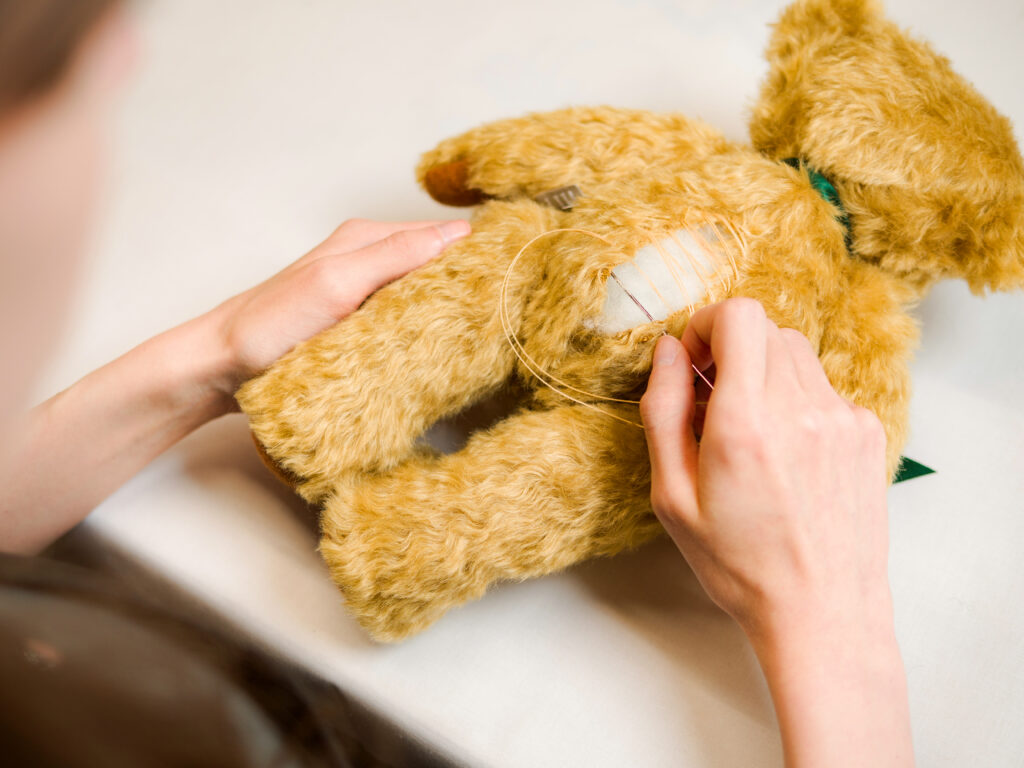
Although the earliest design in Merrythought’s portfolio – on 8 October 1930 – was simply called Elephant, the original Merrythought Bear was created shortly after. In 1931, it appeared in the inaugural Merrythought catalogue. Florence Attwood created the first range of 32 soft toys which included animals, play toys and dolls, alongside the original teddy bear.
In 1939, Merrythought designed a special Giant Panda for London Zoo. This life-sized soft toy acted as a stand-in for London Zoo’s own famous Giant Panda, Ming, during various topical films about her species. It was the first life-like soft toy panda in the world.
In the same year, though, with the company less than a decade old, progress was brought to a shuddering halt by the Second World War. The British Admiralty took over Merrythought’s Ironbridge factory for vital map-making work, forcing soft toy production to stop. Merrythought’s reduced workforce moved to nearby premises and used their skills and materials to help the war effort, producing textile items such as chevrons, helmet linings, igniter bags, gas mask bags and hot water bottle covers.
It wasn’t until 1946 that Merrythought resumed soft toy production in Ironbridge, and there were many tough challenges amid postwar austerity. To make things worse, the Severn burst its banks and flooded the factory in the same year. Despite a supply shortage, a small collection of animals and teddy bears was created, as Merrythought tried to spread a little happiness amid the nation’s bomb-damaged towns and cities, food rationing and families in mourning.
In the years that followed the company grew its sales across Europe and the British Commonwealth. One of firm’s most successful exports is The Cheeky Bear, created by Merrythought designer Jean Barber in 1955 and originally named simply Teddy T. However, at The British Industries Fair that year, The Queen was introduced to Teddy T, and is said to have exclaimed “what a cheeky little bear!” The name stuck and today’s Cheeky Bears, still true to the original 1950s design, are loved and collected around the world.
Gordon’s enterprising son Trayton joined Merrythought in 1949 and focused on growing sales in Britain and new export markets. Pushing for greater production efficiency to keep up with the increasing demand, he even purchased a then state-of-the-art, custom-built stuffing machine from the United States, which is still used in the factory today.
Merrythought’s 1956 Woppit bear found fame as the mascot of land and water speed record breaker Donald Campbell. His little bear was at his side in the cockpit of Bluebird K7 in 1967 when Campbell fatally crashed on Coniston in the Lake District while trying to set a 300mph water speed record in the hydroplane boat. Mr Woppit was found intact in the wreckage – a touching memento of Campbell’s achievements.
Merrythought’s growing prestige was illustrated in 1958 when it was one of only six British companies chosen to exhibit at the Nuremberg trade show in Germany.
First introduced in 1967, Merrythought’s original hippo has been one of the brand’s longest-standing animal characters, appealing to generations of children and adults alike. One was even gifted to the then Prince Charles during a royal visit to Marks and Spencer’s flagship London store in 1982.
Trayton’s son Oliver joined the family firm in 1972, working alongside his father before becoming Managing Director in the early 1980s. Although the third generation of the Holmes family to run the company, Oliver was a pioneer in his own right and brought immense energy and vision to Merrythought.
A charismatic salesman, he took the Merrythought brand to new markets, including the USA and Japan, where he established successful distribution of its premium teddy bears. Merrythought built up a strong collector following in both countries, with Oliver leading Merrythought teams at trade and collector events. Enthusiasts would travel hundreds of miles to meet him and take home a bear that he had personally signed.
Car rallying and hot air ballooning were amongst the adventurous Oliver’s passions. One of his greatest achievements was to pilot a custom-made Merrythought hot air balloon on a challenging flight across the North Pole.
Merrythought celebrated its Diamond Jubilee in 1990 by launching the first international collector teddy bear. The unexpected demand of this limited-edition product encouraged the team to develop a separate collectors’ range of teddy bears in 1991. The age of the teddy bear collector had begun!
Master Mischief was the flagship design of Merrythought’s 1992 collector catalogue; a 14-inch golden mohair bear dressed in short, patched dungarees, and holding a catapult behind his back. The little bear’s mischievous personality appealed to collectors and judges alike, earning him the prestigious TOBY (Teddy Bear of the Year) Award.
Oliver ran the business until his death in 2011. Sarah, his eldest daughter, became involved in Merrythought’s management in 2010 and was joined by her middle sister Hannah in 2011.
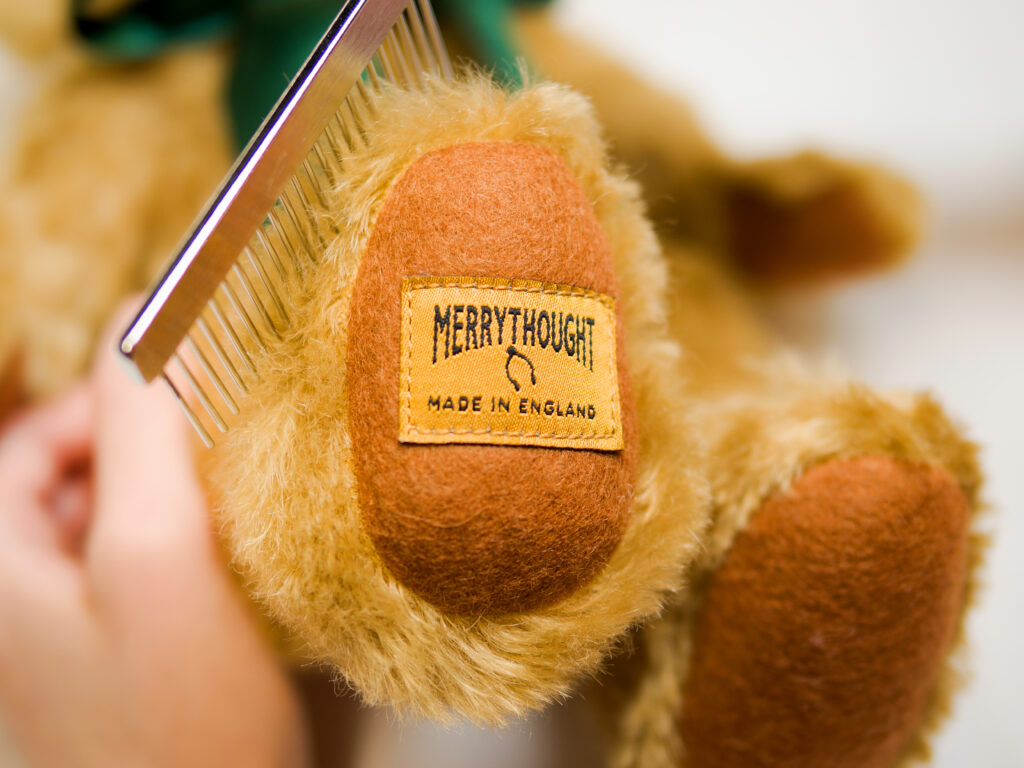
“It was a very challenging time,” Sarah reflects. “My father became ill with cancer and died shortly afterwards with no succession plan. When I was young, I used to visit the factory in the school holidays and play around in the stuffing, but that was about as far as my involvement in the business went. It wasn’t a given that I would move into the business. I was keeping my options open and had moved to London to work in marketing and recruitment.
“Hannah and I had to learn the job very quickly in those months after Dad died. We were hugely appreciative of the support we had from our skilled and loyal staff which helped to carry us through.”
Hannah stepped away from the business after a couple of years, since when Sarah has continued the Holmes legacy, building a company fit for the global challenges of the 21st century. Who’s to say that her six-year-old son Rollo won’t one day walk through the doors as the fifth generation of his family to be MD.
It is a leaner company today – a workforce of just under 30 compared to over 200 at its peak in the 1960s – due to the smaller volume, specialist nature of the brand now.
“On the upside, though, that makes us very adaptable because we have developed a multi-skilled team, more able to meet the challenges we face,” Sarah says.
Displays of historic and current Merrythought products can be seen at the small shop and museum at the Ironbridge site, open daily with free entry. Here visitors can appreciate what made this company such an international flagbearer for British manufacturing quality, of which Shropshire should be immensely proud.
A Merrythought teddy bear remains today the ultimate classic childhood toy, treasured across the world. A towering achievement.

